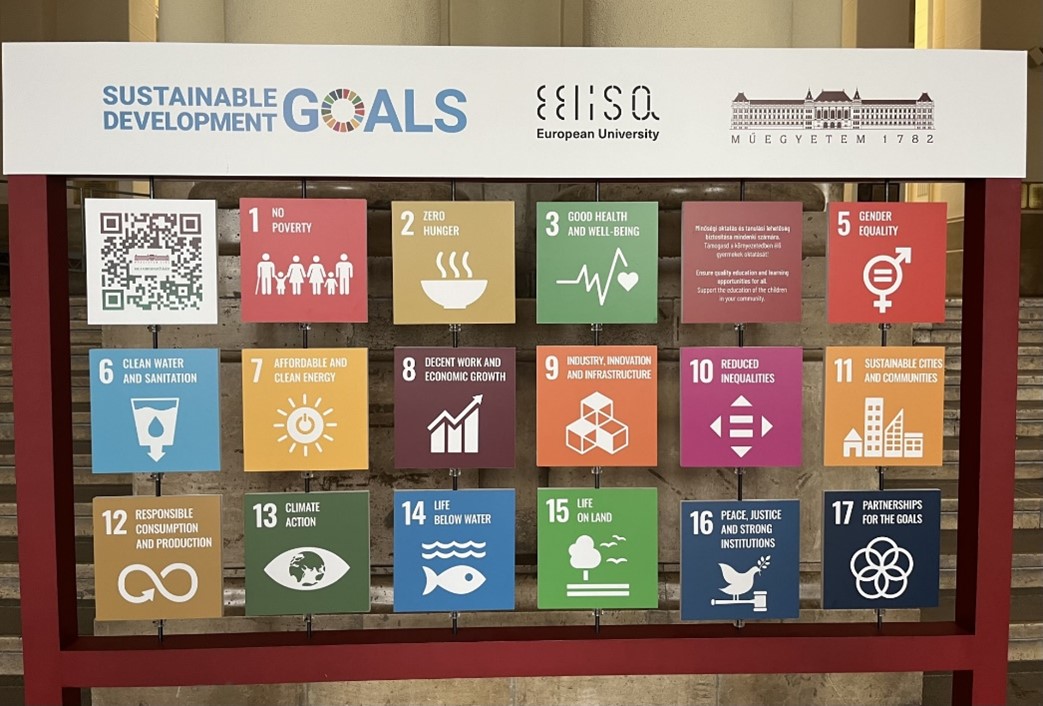2024. April 02.
Our series of articles entitled “Sustainable Tuesday(s)”, will take a look over 17 weeks at the 17 Sustainable Development Goals (SDGs) set by the UN to make the world a better place.
This time, we will explore in more detail goal no. 4, Quality Education, which is to:
Ensure inclusive and equitable quality education and promote lifelong learning opportunities for all.
Support the education of children in your area!
BME is ranked in the top 2-6% of universities in the world, with international rankings ranging from 200-800. The British QS (Quacquarelli Symonds) is one of the most prestigious university rankings, analysing the performance of the world’s top 1,594 higher education institutions. In its global ranking by subject, within that in the field of Engineering & Technology, BME has maintained its top position among Hungarian universities for years. Even after 240 years, a BME degree is a guarantee in the labour market that our students are receiving the highest possible level of education.
In order to maintain and improve the quality of education, the February 2024 Senate meeting adopted the Quality Improvement Programme, which is aimed at systematising the quality assurance principles and general development efforts necessary to achieve the university’s goals set out in the Quality Mission Statement, the Institutional Development Plan (2020-2024) and various strategic documents, in accordance with the ESG 2015 standards.

BME’s mission is to provide the best possible education for all its students and to involve admitted students as early as possible in scientific students' association workshops and colleges for advanced studies, helping them to develop their research and creative skills. The University’s advisory body on talent and skills management is the BME Talent Support Council. It has a wide range of tasks: constantly broadening its knowledge of society, developing environmental awareness, presenting engineering innovations in an accessible way, and looking at the problems affecting the wider society in an objective and credible way.
The university’s talent management activities also include cultivating relationships with secondary schools to ensure student recruitment (organising open days, participating in career guidance days, providing laboratory visits, launching academic competitions). This also includes the summer camp of the Faculty of Natural Sciences, the Science Camp, which introduces the diverse world of mathematics and physics to secondary school students interested in science. BME also takes great care to reach out to even younger age groups. Its popular higher education simulation camp, organised since 2015, invites students aged 8 to 14 to spend a week at the Budapest University of Technology and Economics to try what it is like to be a university student. The Children’s University participants listen to lectures and experiment in small groups during practice-oriented seminars, just like real undergraduates. The aim of the camp is to introduce children to science subjects from a young age, in a playful, friendly atmosphere, by giving them the opportunity to gain first-hand experiences. The same goal is served by the spectacular experiments of Károly Hartlein, master instructor at BME’s Institute of Physics, which are available to young and old alike during events such as the Children’s Day Physics, Santa Claus Physics or Researchers’ Night.
Budapest University of Technology and Economics also takes great care to help students with special needs. A growing range of services (e.g. counselling, tutoring, peer mentoring, help with administrative affairs, applications) are available to ensure that all students have equal opportunities to pursue their studies according to their abilities and motivation, and that their special needs do not hinder their academic performance and integration.
Knowledge Network – Mapping and sharing good practices and educational innovations across BME is a key mission of the quality objectives. By supporting the community of academic staff members, creating opportunities for peer learning and networking, a professional community can be established that is better able to find solutions to the educational challenges facing higher education. To support this, we have set up the Knowledge Network platform to collect good practices from individuals or departments. This will be available to all during the spring term of the 2023-2024 academic year. From the autumn term of the 2024/2025 academic year, BME’s OHV questionnaire will also be renewed. The aim of renewing the Student Feedback on Teaching (OHV) questionnaire is to enable students to give more differentiated feedback on the pedagogical and methodological work of lecturers, thus helping the latter to develop in this respect. The renewal of the OHV is also linked to the development of the internal training system for academic staff members.
In addition to the above, 8 subjects, 6 publications, 2 research projects, and 7 student projects can be linked to the Quality Education goal, covering the activities of almost all BME faculties.
|
The term SDG stands for the 17 Sustainable Development Goals established by world leaders at the 2015 UN summit to set new directions for global development. In a series of articles called “Sustainable Tuesday(s”, starting today, we will take a look at the 17 Sustainable Development Goals (SDGs) over 17 weeks and show what BME is doing to achieve them, within its own means. You can check out these development goals in a playful way with the help of boards placed at the entrances of the 3 busiest buildings (E, K, Q) on the BME campus. For more information on this topic, you can join the BME GreenHub Facebook group and visit BME’s main website to access our BME for Sustainability platform |


